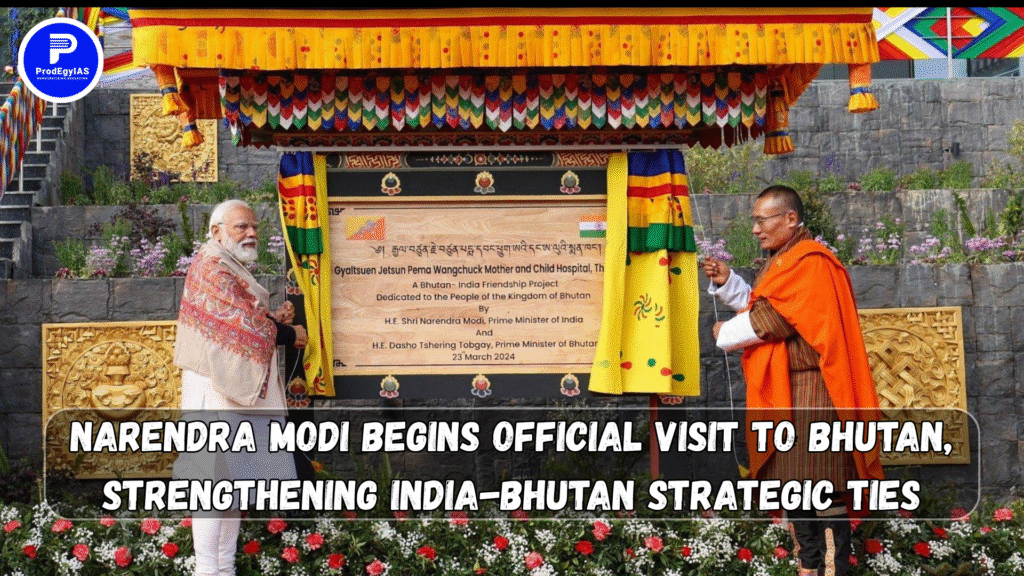
1. Introduction
Prime Minister Narendra Modi left on a two-day official visit to the Kingdom of Bhutan on November 11, 2025, marking a fresh effort to fortify the centuries-old friendship between India and Bhutan. A significant hydroelectric project that highlights Bhutan’s involvement in India’s energy-security and regional connectivity policy will be inaugurated during the visit, which is scheduled to coincide with the 70th birthday festivities of Bhutan’s fourth King, Jigme Singye Wangchuck.
Why it’s important
- Strategically and environmentally, Bhutan is an important ally of India in the Himalayan area; deepening relations helps India maintain its position in the changing geopolitics of South Asia.
- The hydropower project connects Bhutan’s renewable potential to India’s demand and sustainability objectives, reflecting India’s interest in clean energy and cross-border infrastructure.
- In addition to formal state relations, cultural diplomacy during the King’s birthday strengthens Buddhist bonds, people-to-people contacts, and shared ideals, all of which enhance soft-power dynamics.
- Strong ties between India and Bhutan send a clear strategic message about India’s support for its Himalayan neighbours in the larger context of Indo-Pacific conflict and China’s expanding influence in the area.
Important Events & Highlights
- In order to strengthen symbolic relations and the cultural aspect of diplomacy, Prime Minister Modi will attend the King’s birthday celebrations in Thimphu.
- A large-scale hydropower station that would boost Bhutan’s electricity exports to India and assist India in meeting its green energy goals is anticipated to be formally inaugurated during the visit.
- Bilateral trade, connectivity through the Himalayan region, tourism collaboration, and development projects in Bhutan’s border regions are potential topics of discussion between the two governments.
- In areas where Bhutan’s experience fits with India’s green aspirations, such as climate resilience, forest protection, and Himalayan ecology, both parties may consider working together.
Difficulties and Strategic Aspects
- In hilly areas, infrastructure and cross-border projects encounter financial, logistical, and environmental challenges; maintaining sustainable growth without harming the environment is still crucial.
- Even if there is a lot of cultural symbolism, it takes constant funding and policy implementation to turn goodwill into real advantages (such connectivity, services, and investment).
- The strategic interests of India and Bhutan don’t always coincide; India needs to be mindful of Bhutan’s national priorities, sovereignty, and diplomatic contacts with other nations.
- Maintaining balanced diplomacy while defending national interests is crucial in the complicated regional context of the India-Bhutan cooperation, where other nations, most notably China, are fighting for influence.
The Way Forward
- To turn projected realms into reality, India should fulfil its declared project promises particularly the hydroelectric link, connectivity corridors and climate-friendly projects.
- To maintain momentum, India should strengthen institutional frameworks for collaboration such as cooperative task forces, frequent high-level discussions, funding tools and monitoring systems.
- Interpersonal relationships should be strengthened through various scholarship programs, cross-border travel, cultural exchanges and tourism marketing can surely strengthen bilateral ties outside of formal channels.
- Every infrastructure and connection project in Bhutan needs to incorporate thorough ecological evaluations, community input, and long-term maintenance support. So sustainability should be our top priority
- Our Prime minister should utilize the visit as a springboard for India to develop a foreign policy sub-framework tailored to the Himalayas, integrating energy, environment, culture, and security with Bhutan and other Himalayan neighbours.
More than just a formal visit, Prime Minister Narendra Modi’s journey to Bhutan on November 11–12 is a calculated reaffirmation of India’s dedication to its Himalayan ally. This visit could improve Bhutan’s growth trajectory, improve India’s regional stature, and advance the two objectives of connectivity and sustainability in the Himalayan arc if it is accompanied by tangible action and respect for one another.
UPSC General Studies Paper Preparation
| Topic | |
| UPSC Syllabus | UPSC Free Notes |
| UPSC Optional Subjects | Khushhali Solanki (AIR 61, UPSC CSE 2023) |
Public Administration Optional Exam Preparation
Topic | |
About the Author: Jyoti Verma



